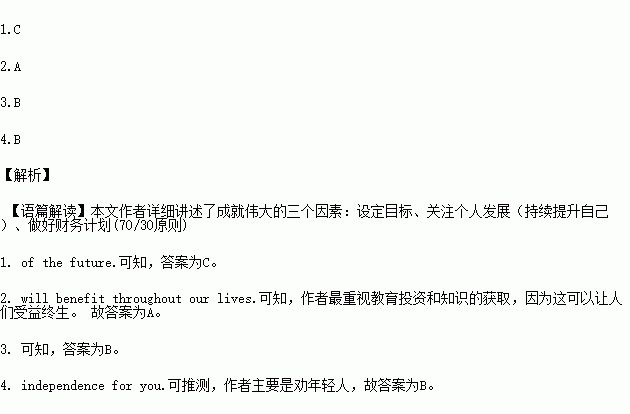题目内容
A
Ten years ago I went into the studio and recorded a 56-minute video for teenagers called “Three keys to greatness.” Although my focus was for teenagers, the principles I shared certainly apply to adults as well. Recently I was asked to list these three things. Now for your benefit here they are again.
Firstly, set goals. I call it the view of the future. Most people, including kids, will pay the price if they can see the promise of the future. So we need to help our kids see a clear future, and they will be ready to pay the price today to attain the rewards of tomorrow. Goals help them do this.
Secondly, pay attention to personal development. Simply making consistent investments in our education and knowledge we will benefit throughout our lives. I suggest having an amount of time set aside for reading books, listening to recording, attending discussion, keeping a journal and spending time with other successful people. Mr Jones recommends reading a lot as a good method of improving yourself. The simple fact is that you need to change your outlook on life and on yourself, as it will have a positive influence on your personality and outlook. You should learn something new about your profession every single day until you’re an expert in the field.
Thirdly, make a financial plan. I call it the 70/30 plan. After receiving your salary, simply setting aside 10% for saving, 10% for investing and 10% for giving, the rest for your life. And over time when you have your own family this will guarantee financial independence for you.
If people focus on doing these three simple things over a long period of time, I believe they will be surely successful!
1.The advantage of setting goals is that ______.
A. you’ll know the future of the world
B. you’ll know what kind of person you will become
C. you’ll be willing to work hard for your future
D. you’ll be satisfied with what you have achieved
2.The author lays the most stress on ______.
A. gaining knowledge
B. making good friends
C. attending discussions
D. listening to recordings
3.According to the passage, one picture of reading a lot is to ______.
A. lead a better life
B. have a good personality and outlook
C. change your position
D. become an expert in many fields
4.Whom does the author mainly advise to make a financial plan?
A. All kinds of people.
B. The young people.
C. The middle-aged people.
D. The rich people.
 阅读快车系列答案
阅读快车系列答案
